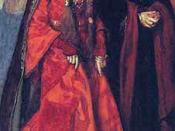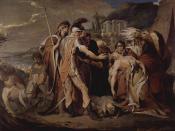Aspects of Good and Evil
Hamlet, Othello, Macbeth and King Lcar are bright particular stars in the poetic firmament. They have shown uncanny vitality in the theatre, with productions abundant even in periods when whole clusters of Shakespeare's comedies and histories were dropped from the repertory. Although king Lear was acceptable only in adapted form for a century and a half after 1680, at least its semblance was constantly staged; and its fellow masterpieces have been the least affected of all Renaissance literature by changing climates of sensibility. Gabriel Harvey, a pundit of Shakespeare's own times, remarked
that Hamlet has something in it 'to please the wiser sort.' The wiser sort have been occupied with it ever since. It was Hamlet which first induced Coleridge to exercise his 'turn for philosophical criticism,' and it was this play along with Othello, Macbeth, and King Lear which provided the substance of Bradley's famous lectures on Shakespeare early in the present century.
These four plays account for more than half of the vast body of Shakespearean criticism in existence. The flow of commentary has by no means abated; indeed now more than ever before 'definition' of Shakespearean tragedy is the literary critic's bow of Achilles. Whether great tragedy (or great art in general) is susceptible to definition is a moot point, but the attempts have often been illuminating as well as valiant. They will not be rivaled here; however a brief note on Elizabethan conceptions of tragedy may be helpful to the reader.
Most discussions begin or end with quotations from Aristotle's Poetics, but the Aristotelian definition of tragedy had little currency in Elizabethan England, and no influence whatever upon the popular playwrights. Aristotle had analyzed Greek tragedy with the acumen of an intellectual "genius, and although he did not succeed in defining...


